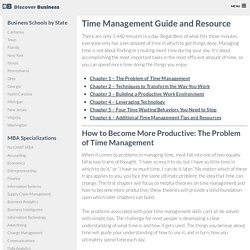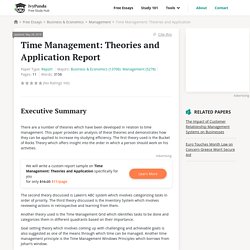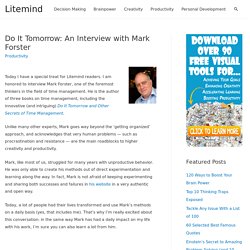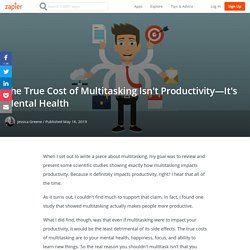

Step-by-Step Guide with Templates. Planning on turning your vision into reality?

And what’s your best way to avoid challenges and problems during this journey? A solid action plan. We have outlined 6 steps explaining how to write an action plan. Once you familiarize yourself with them, go ahead and use the editable templates below to start planning right away. What is an Action Plan. SMART Goals - Time Management Training From MindTools.com. The trouble with not having a goal is that you can spend your life running up and down the field and never score.– Bill Copeland Do you ever feel like you're working hard but not getting anywhere?
Maybe you see little improvement in your skills or achievements when you reflect on the last five or 10 years. Or perhaps you struggle to see how you'll fulfil your ambitions during the next few years. Autodiagnostic : tempsdinite en gestion du temps - Institut Gestion du Temps. Autodiagnostic : chronophagie en gestion du temps - Institut Gestion du Temps. Do Now - Focused Timeboxing - Apps on Google Play. Simplifying the todolist: Planned - stuff to do now/today.

Unplanned - brain bump, worry about it later stuff. Routines - stuff you repeat a lot/want to plan ahead for/interval training and since you can load them into any other list they can be used over and over again as building blocks for easily managing lots of variations of your day - not to mention that they can be scheduled to be loaded into your planned list automatically. Helpful for those with ADD/ADHD and need help staying focused.
7 secrets to master timeboxing - Dreimannzelt Adventures - Medium. Timeboxing is a simple technique, but it has its challenges when implemented in practice.

This article lists some typical challenges when timeboxing and how to master them. It’s a destillation of many years of experience in applying the technique in practice. Deep Habits: The Importance of Planning Every Minute of Your Work Day - Study Hacks - Cal Newport. December 21st, 2013 · 231 comments Time Blocking The image above shows my plan for a random Wednesday earlier this month.

My plan was captured on a single sheet of 24 pound paper in a Black n’ Red twin wire notebook. This page is divided into two columns. In the left column, I dedicated two lines to each hour of the day and then divided that time into blocks labeled with specific assignments. How to Manage Time. There are only 1,440 minutes in a day.

Time Management: Theories and Application - 3158 Words. Executive Summary There are a number of theories which have been developed in relation to time management.

This paper provides an analysis of these theories and demonstrates how they can be applied to increase my studying efficiency. The first theory used is the Bucket of Rocks Theory which offers insight into the order in which a person should work on his activities. The second theory discussed is Lakein’s ABC system which involves categorizing tasks in order of priority. The third theory discussed is the Inventory System which involves reviewing actions in retrospective and learning from them.
Time Management Theory. Management of Time – IspatGuru. Time Management Skills. Time is a resource and needs to be utilized in an effective and efficient manner to achieve the desired goal.

The importance of managing time has been put forth by the legendary statesman, Benjamin Franklin in his popular quote, "Time is money". What is Time Management? Time Management is the act or process of planning and exercising conscious control over the amount of time spent on specific activities, especially to increase effectiveness, efficiency or productivity. Time management may be aided by a range of skills, tools, and techniques used to manage time when accomplishing specific tasks, projects and goals complying with a due date. This set encompasses a wide scope of activities, and these include planning, allocating, setting goals, delegation, monitoring, organizing, scheduling, and prioritizing.
Planning is the process of thinking about and organizing the activities required to achieve a desired goal. Do It Tomorrow: An Interview with Mark Forster. Today I have a special treat for Litemind readers.

I am honored to interview Mark Forster, one of the foremost thinkers in the field of time management. He is the author of three books on time management, including the innovative (and intriguing) Do It Tomorrow and Other Secrets of Time Management. Unlike many other experts, Mark goes way beyond the ‘getting organized’ approach, and acknowledges that very human problems — such as procrastination and resistance — are the main roadblocks to higher creativity and productivity.
Mark, like most of us, struggled for many years with unproductive behavior. - E-mails 'hurt IQ more than pot' - Apr 22, 2005. 58 Time Management Tips For Work - Clockify. The Surprisingly High Cost of Multitasking. Multitasking seems like such a great way to get so much done in so little time.

Who wouldn’t want to knock out some emails, have lunch, and listen in on a phone conference all at the same time? Sure, researchers have debated the effectiveness of doing multiple things at once, but being a pro multitasker still seems like a dream come true. The True Cost of Multitasking Isn't Productivity—It's Mental Health. When I set out to write a piece about multitasking, my goal was to review and present some scientific studies showing exactly how multitasking impacts productivity.

Because it definitely impacts productivity, right? I hear that all of the time. As it turns out, I couldn't find much to support that claim. In fact, I found one study that showed multitasking actually makes people more productive. What I did find, though, was that even if multitasking were to impact your productivity, it would be the least detrimental of its side effects. Plan d'action: créer le votre en 8 étapes (modèle gratuit à télécharger) Ce qui suit s'adresse à vous si vous souhaitez maximiser les chances d'atteindre votre objectif.
What is Goal Setting and How to Do it Well. Do you ever feel like you’re sleepwalking through life with no real idea of what you want? Perhaps you know exactly what you want to achieve, but have no idea how to get there. That’s where goal setting comes in. Goals are the first step towards planning for the future, and play a fundamental role in the development of skills in various facets of life, from work to relationships and everything in between.
They are the target at which we aim our proverbial arrow. Roue de deming. The True Cost of Multitasking Isn't Productivity—It's Mental Health. The Surprisingly High Cost of Multitasking. 5 Time Management Tips for Small Business Owners. As a small business owner, you're probably intimately familiar with the feeling of always juggling endless tasks. Between client deadlines, payments to keep track of and customers to please, it can feel like your to-do list never gets any smaller. You could say that effective time management is one of the most important skills for a small business owner. The good news is it's a skill you can learn – and since it's not an exact science, you can find the tricks and habits that work best for you.
If you feel like there are never enough hours in the day, these five tips can help you stay on track and manage your time smartly and effectively. 1. Clutter, both literal and figurative, can slow down your work and bog you down. Begin by creating a list of five realistically attainable goals for the week. Pay attention to when you're most productive, whether it's a specific time of day or simply after your morning jog. 2. When it comes to managing overall workflow, Trello is a great resource. 3.
How To Stay Motivated When Working Alone - Fundera Ledger. Editorial Note: Fundera exists to help you make better business decisions. That’s why we make sure our editorial integrity isn’t influenced by our own business. The opinions, analyses, reviews, or recommendations in this article are those of our editorial team alone. If you’re launching your own small business, the chances are that you’re probably going to spend a decent amount of time flying solo — at least until you get up and running. Working alone can be great, but it’s also littered with the occupational equivalent of landmines. It’s easy to get wrapped up in distractions or find yourself unmotivated.
Les stratégies Time Boxing, de « mise en boite » du temps, peuvent vous aider dans votre projet. Par Lisa Drake. 7 secrets to master timeboxing - Dreimannzelt Adventures - Medium. Buffer time builds better performance and better results. So often, when people decide that they want to become more productive, they rush straight into it. They are enthusiastic and eager and, they want to make quick improvements. Unfortunately, their focus tends to be solely on getting more done which might seem like the right focus but is actually a major obstacle to high productivity levels.
When you are focused solely on the quantity of work that you can get done, you lose sight of the importance of your work. In getting more done, you don’t necessarily get your most important tasks completed. 7 secrets to master timeboxing - Dreimannzelt Adventures - Medium. (186) How to gain control of your free time. (185) The Art of Stress-Free Productivity: David Allen at TEDxClaremontColleges. (185) Getting Things Done (GTD) by David Allen - Animated Book Summary And Review.
- E-mails 'hurt IQ more than pot' - Apr 22, 2005. (148) How To Multiply Your Time. 6 astuces pour que le télétravail soit une réussite. Risques d’isolement, manque de contrôle sur l’activité du salarié concerné, défis managériaux… Le télétravail inquiète encore de nombreuses entreprises. Pourtant, il suffit de prendre quelques précautions pour en récolter les bénéfices. 1- Etre convaincu de ses vertus C’est la première condition pour que le télétravail ne soit pas un échec : « l’entreprise doit le faire non pas sous la pression des salariés, mais parce qu’elle est convaincue que le télétravail améliore la qualité de vie au travail, et qu’une meilleure qualité de vie au travail, ce sont de meilleurs résultats », pose tout d’abord Yves Lasfargue, directeur de l’OBERGO (Observatoire des conditions de travail et de l’ergostressie).
Il lui faut aussi accorder une confiance totale à ses télétravailleurs. EQUILIBRE DES TEMPS : LES REGLES D’OR DU TELETRAVAIL – Technologia. « Le travail déborde » tel était le cri d’alarme poussé par Technologia à l’issue de son enquête sur « les effets du travail sur la vie privée », publiée en mars 2012. 12 Tips for Being a Better Remote Employee - Remote Work Hub. 6 Simple Time Management Tips for Remote Workers - Remote Work Hub. You & the Freelance Life - House of van Schneider. How to Not Suck at Remote Working - DESK Magazine. I dislike everything about working in an office. The daily commute, the empty conversations, the distractions and of course the meetings. But on top of it, my productivity never peaked when working in an office environment.
I only showed up to clock my eight hours, then went home to do my “real” creative work. Often I didn’t even do anything at the office, just pretended to be busy before I could finally call it a day at 5 p.m. That was about 14 years ago and things have changed quite a bit since then. Today, remote working seems to be more popular than ever. How to Manage Your Time as a Remote Worker - DESK Magazine. Recently I wrote an article titled How to Not Suck at Remote Working. One of the main rules was to know who you are, as I believe remote working is just not for everyone. However, if time management is your main issue, there’s hope.
4 règles essentielles pour gérer le travail à distance. Les effets négatifs du télétravail ! Les difficultés du travail à distance : un constat reconnu ! Télétravail : Comment gérer son temps de travail à domicile ? – Codexa. Le télétravail demande une grande responsabilité en termes de gestion de son temps et de sa charge de travail. Bien organisé, le travail à domicile favorise une bonne conciliation entre vie privée et vie professionnelle. Voici quelques difficultés auxquelles les télétravailleurs peuvent être confrontés, et des solutions pour y faire face.